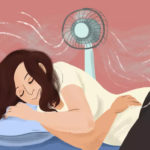High Blood Pressure
Caffeine, a component of coffee, can temporarily elevate blood pressure. Hence, if you have frequent high blood pressure, it’s advisable to avoid this beverage, especially before engaging in activities that may increase blood pressure, such as exercise or strenuous labor.
Despite this, coffee contains bioactive compounds with potent antioxidant properties that can combat oxidative stress and benefit individuals with high blood pressure. Therefore, consider limiting your coffee intake to no more than two cups per day.

Limit coffee consumption to no more than two cups per day
Sleep Disturbances or Poor Sleep Quality
Sleep disturbances or poor sleep quality are common symptoms of coffee consumption due to caffeine’s stimulating effects. It prevents adenosine receptors in the brain from promoting sleep.
If you experience frequent sleep issues, refrain from consuming coffee and limit its intake within six hours of bedtime.
Anxiety Disorders
Caffeine can induce a physical response similar to anxiety, including warmth, increased heart rate, and faster breathing. Consequently, individuals with anxiety disorders may experience exacerbated symptoms if they consume excessive coffee.
Moreover, coffee can disrupt sleep, leading to fatigue and heightened anxiety.
Weight Gain
Coffee has been shown to aid weight loss by suppressing appetite and boosting metabolism.
However, it can also disrupt sleep, potentially contributing to weight gain. Additionally, adding sugar or milk to coffee can increase calorie intake.
Gastroesophageal Reflux Disease (GERD)
Caffeine in coffee has a relaxing effect on the lower esophageal sphincter, allowing stomach acid to reflux into the esophagus in individuals with sensitive stomachs. According to the American Gastroenterological Association, avoiding caffeinated beverages like coffee, soda, and tea is recommended to reduce GERD symptoms.
Anxiety and Tremors
Excessive coffee consumption can elevate adrenaline levels in the body, causing anxiety, tremors, and feelings of tension.
Seizures
Caffeine may increase the risk of seizures in certain individuals with a history of epilepsy or related neurological conditions.
Digestive Issues
Caffeine can cause digestive problems such as diarrhea, nausea, and indigestion, especially in individuals with sensitive stomachs.
Irregular Heart Rhythm
Excessive coffee intake can increase heart rate and lead to irregular rhythms, particularly in those with a history of cardiovascular issues.
Dependence
Overconsumption of coffee can lead to caffeine dependence, resulting in symptoms like fatigue, headaches, and irritability when caffeine is not available.
Recognizing and understanding these indications enables you to manage your coffee consumption responsibly and safeguard your health. Consider reducing your intake or discontinuing coffee altogether if you experience any adverse health-related effects.
Tips for Keeping Cool on a Hot Summer Day
As extreme weather patterns become increasingly common, many are struggling to find ways to cope. With temperatures in our country rising and cooling far beyond what used to be considered normal for the season, winter often feels like spring and summer can be oppressive and sweltering. How can we prepare for and manage the drastic shifts in climate?
What You Need to Know About Chocolate
Despite its tasty flavor, there are long-standing concerns that eating too much chocolate may lead to weight gain and tooth decay. Despite this, chocolate continues to be a popular indulgence during holidays and a meaningful gift to share with loved ones. It is also a popular ingredient for beauty treatments.



































